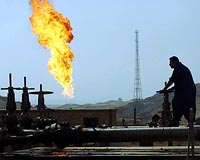 |
Abuja, Nigeria (UPI) Oct 22, 2009 Nigeria's government plans to allocate 10 percent of its oil revenue for the troubled Niger Delta region, which produces most of the country's crude, in a new bid to stamp out a tribal insurgency that has cut oil output by one-third. But critics say that the money, far from appeasing the impoverished Ijaw tribes of the swampy region and buying off the rebels, will only vanish into Nigeria's notoriously corrupt political bureaucracy and fuel the rebellion. Nigeria, ranked fifth among the United States' oil suppliers, is desperate to boost production, currently pegged at about 1.7 million barrels per day, well below the 2.5 million barrels it pumped daily in 2005. The rebels, led by the umbrella Movement for the Emancipation of the Niger Delta, took up arms five years ago demanding a greater share of the country's oil revenue. Some 75 percent of Nigeria's oil production comes from the delta region. That oil produced 80 percent of state revenue. But the Ijaw tribes have seen little of that over the years, in part because of the rampant corruption that plagues the country and siphons off the funds before they reach the people. The government's plans have not been spelled out in any detail yet. But Mohammed Barkindo, director of the state-owned Nigerian National Petroleum Corp., says that detailed discussions are under way to determine how the nine oil-producing delta states will receive a better share of the oil wealth. Since 1999, 13 percent of oil revenues have been supposed to go to the producing states. A government task force recommended in November that this should be raised to 25 percent and then gradually increased to 50 percent. The government has not indicated whether this is the way it plans to go. U.S.-based think tank Strategic Forecasting notes that whatever blueprint President Umaru Yar'Adua endorses, "the lion's share of these funds will likely be pilfered by state and local officials." It said that all of these "are aligned with the ruling People's Democratic Party," which would use it to "purchase political loyalty as part of a larger PDP strategy to secure victory in the 2011 national elections." That could even involve putting some of it in the pockets of the warlords who make up the rebel alliance to buy them off, the think tank said. At the very least, whatever the merits of any plan the government comes up with, the insurgency is likely to be dampened while Yar'Adua confers with rebel leaders. The violence has ebbed since the government declared an amnesty in July. That was bolstered by a rebel cease-fire that expired Oct. 4 after several key rebel leaders had surrendered with around 8,000 of their men under the amnesty. The rebel movement declared it would resume operations, but so far no serious incidents have been reported. This calm is likely to persist while negotiations on the revenue-sharing reforms continue. These are expected to last for several weeks. Share This Article With Planet Earth
Related Links Powering The World in the 21st Century at Energy-Daily.com
 Big Oil cuts deals with Iraq
Big Oil cuts deals with IraqBaghdad (UPI) Oct 21, 2009 The government's gamble that the lure of Iraq's oil wealth will persuade major international oil companies to invest billions of dollars in upgrading the country's ramshackle energy on Baghdad's terms seems to be finally paying off. Several weeks before a crucial auction of licenses for some of Iraq's biggest oil fields scheduled for mid-December, Iraqi officials say that several global ... read more |
|
| The content herein, unless otherwise known to be public domain, are Copyright 1995-2009 - SpaceDaily. AFP and UPI Wire Stories are copyright Agence France-Presse and United Press International. ESA Portal Reports are copyright European Space Agency. All NASA sourced material is public domain. Additional copyrights may apply in whole or part to other bona fide parties. Advertising does not imply endorsement,agreement or approval of any opinions, statements or information provided by SpaceDaily on any Web page published or hosted by SpaceDaily. Privacy Statement |